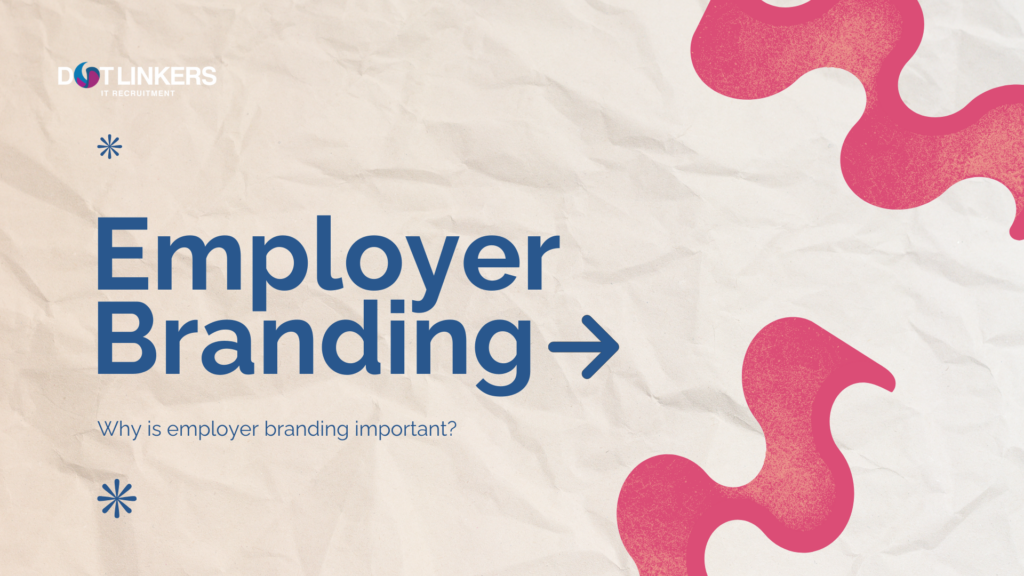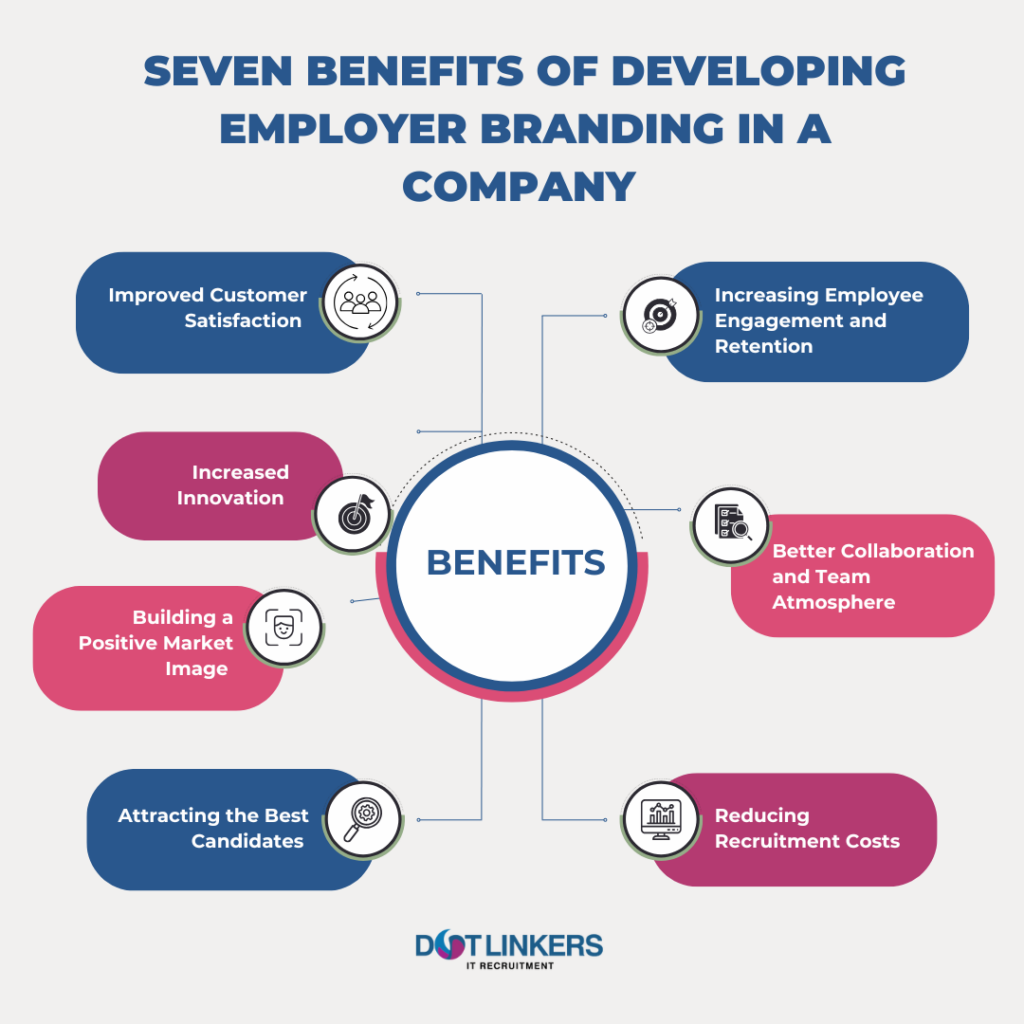Table of Contents
In today’s rapidly evolving world of technology, attracting top IT talent is becoming an increasingly significant challenge. Companies must compete not only in terms of salary and benefits but also in terms of their employer brand. Employer Branding (EB) is a strategy that allows companies to stand out in the job market and attract the most talented specialists.
In the age of social media and easy access to information, candidates have more opportunities than ever before to learn what it’s like to work at a company. Reviews from current and former employees, feedback on platforms like GoWork, and the company’s presence on social media all play a role in shaping potential candidates’ decisions. Therefore, building a strong employer brand has become a key element of recruitment strategy. A strong employer brand shapes how candidates perceive your company as a workplace. This directly influences their decision to apply, their engagement during the recruitment process, and their ultimate decision to join the team. It also fosters positive relationships with current employees, which boosts their engagement and loyalty. As a result, companies with a well-developed Employer Branding strategy can expect lower recruitment costs, reduced employee turnover, and increased productivity.
In this article, we will explore why Employer Branding is so important, the benefits it brings to companies, and how to effectively implement it to attract and retain top IT talent.

What is Employer Branding?
Employer Branding (EB) is the process of building and promoting a company’s image as an attractive employer. It is a strategy aimed at creating a positive perception of the company in the eyes of both current and potential employees, as well as other stakeholders. Employer Branding encompasses a wide range of activities designed to differentiate the company in the job market and attract the best talent.
Key Elements of Employer Branding:
Organizational Culture: The foundation of every company. Clearly defined values, mission, and vision help build a cohesive organizational culture that attracts candidates who share similar values. Organizational culture influences employees’ daily experiences and shapes their engagement and loyalty.
Reputation: The opinions of current and former employees, reviews on platforms like GoWork, Glassdoor, and the company’s overall reputation in the job market are extremely important. Positive reviews can attract the best specialists, while negative ones can deter potential candidates. A company’s reputation also affects its relationships with clients, business partners, and investors.
Communication: Consistent and authentic messaging about the company, both internally and externally. This includes everything from job postings and social media activity to internal communications. Effective communication helps build trust and transparency, which is crucial for a positive employer image.
Candidate Experience: A professional and friendly recruitment process that leaves a positive impression, even if the candidate is not hired. Every stage of the recruitment process should be well thought-out and aligned with the company’s values. Positive candidate experiences can turn them into brand ambassadors who will recommend the company to others.
Development and Training: Opportunities for professional and personal growth are crucial for attracting ambitious candidates. Companies that invest in the development of their employees build a stronger employer brand. Training programs, mentoring, and career paths help employees develop their skills and achieve their professional goals.
Employer Branding is not just a recruitment tool but also a business strategy that impacts all aspects of the company’s functioning. A strong employer brand can contribute to increased employee engagement, improved retention, and a positive company image in the job market. In the long run, a well-developed Employer Branding strategy can bring measurable financial and operational benefits to the company.
Employer Branding and Recruitment why it is important
A strong employer brand is an effective way to showcase what it’s like to work at a company, what its values are, its mission, and the benefits it offers. Research shows that over 75% of candidates research a company’s reputation before applying. Candidates are more likely to choose organizations with a positive work culture, opportunities for growth, and a clear sense of purpose.
For IT specialists, employer branding is even more important because their skills are highly sought after, and they have a wide range of job offers to choose from. A well-defined employer brand can reduce employee turnover by 28% and cut recruitment costs by 50%, making it a valuable business asset.
- Attracting the Best Talent
Employer Branding helps companies stand out from the competition and attract candidates who are not only qualified but also align with the company’s organizational culture. IT candidates often seek employers who offer not only attractive salaries but also opportunities for growth, innovative projects, and a friendly work environment. A strong employer brand that clearly communicates these values attracts top specialists.
- Increasing Employee Engagement and Retention
Employer Branding doesn’t end at the recruitment stage. A strong employer brand also influences the engagement and loyalty of current employees. Employees who are proud of their employer and identify with its values are more engaged in their work and less likely to leave their job. In the IT industry, where employee turnover can be high, Employer Branding helps in building a stable team.
- Reducing Recruitment Costs
Investing in Employer Branding can lead to measurable savings for companies. A strong employer brand attracts a larger pool of candidates, reducing the need for expensive recruitment agencies and paid job advertisements. Additionally, positive candidate and employee experiences result in more referrals, which is one of the most effective ways to attract talent.
- Building a Positive Market Image
In the IT industry, where innovation and company reputation are critical, Employer Branding helps build a positive market image. Companies perceived as attractive employers gain a competitive edge not only in recruitment but also in relationships with clients, business partners, and investors. A strong employer brand can contribute to increasing the company’s value and its market position.
- Adapting to Changing Candidate Expectations
Modern generations of workers, such as Millennials and Generation Z, have different expectations of employers compared to previous generations. They value flexibility, opportunities for growth, work-life balance, and social responsibility. Employer Branding allows companies to adapt to these changing expectations and attract young talent that will drive their growth.
Seven Benefits of Developing Employer Branding in a Company
Employer Branding brings numerous benefits that extend beyond the recruitment process. A strong employer brand impacts various aspects of a company’s operations, from attracting talent to increasing employee engagement. Below are the key advantages of Employer Branding:
1. Attracting the Best Candidates
A strong employer brand attracts top candidates who are not only qualified but also align with the company’s organizational culture. Candidates often seek employers that offer not just competitive salaries but also growth opportunities, innovative projects, and a friendly work environment. Employer Branding helps companies stand out from the competition and attract the most talented specialists.
2. Increasing Employee Engagement and Retention
Employer Branding influences the engagement and loyalty of current employees. Employees who are proud of their employer and identify with its values are more engaged in their work and less likely to change jobs. High levels of engagement translate to better productivity, innovation, and lower employee turnover.
3. Reducing Recruitment Costs
Investing in Employer Branding can bring tangible savings to companies. A strong employer brand attracts a larger pool of candidates, reducing the need for costly recruitment agencies and paid job advertisements. Additionally, positive experiences from candidates and employees lead to more referrals, one of the most effective ways to acquire talent.
4. Building a Positive Market Image
Employer Branding helps build a positive image of the company in the market. Companies perceived as attractive employers gain a competitive advantage not only in recruitment but also in relationships with clients, business partners, and investors. A strong employer brand can contribute to the growth of the company’s value and market position.
5. Better Collaboration and Team Atmosphere
A strong employer brand fosters a positive team atmosphere. Employees who feel valued and identify with the company’s values are more likely to collaborate and work together to achieve goals. This, in turn, leads to better team and company performance.
6. Increased Innovation
Employees who are engaged and loyal to the company are more likely to take initiatives and drive innovation. A strong employer brand encourages the creation of an environment where employees feel comfortable sharing their ideas and experimenting with new solutions. This can lead to the development of new products, services, and processes that contribute to the company’s success.
7. Improved Customer Satisfaction
Satisfied and engaged employees lead to better customer service. Employees who are proud of their employer and identify with its values are more likely to provide high-quality services and care about customer satisfaction. This can lead to increased customer loyalty and positive recommendations.

Disadvantages of Employer Branding: Do They Exist?
While Employer Branding brings many benefits, there are also some drawbacks and challenges associated with its implementation. Below are the key ones:
High Costs
Building and maintaining a strong employer brand can be expensive. Investments in marketing campaigns, training, development programs, and activities aimed at improving organizational culture can require significant financial resources. For small and medium-sized enterprises, these costs can be particularly burdensome.
Time-Consuming
The process of building a strong employer brand takes time. Achieving visible results may take months or even years. It requires continuous monitoring, adjusting strategies, and involvement from management and employees. Companies must be patient and consistent in their efforts.
Risk of Miscommunication
Improper actions related to Employer Branding can negatively impact the company’s image. Sharing inauthentic or exaggerated information may lead to disappointment among candidates and employees, which can result in negative reviews and a decline in trust towards the company. It is crucial for communication to be consistent and aligned with reality.
High Candidate Expectations
A strong employer brand can attract candidates with high expectations. If the company is unable to meet these expectations, it could lead to disappointment and negative feedback. It is important for the company to be transparent and realistic in its messaging to avoid misunderstandings.
Employer Branding in Recruitment
Employer Branding is not just a trendy concept but a key element of an effective recruitment and human resources management strategy. A strong employer brand can be a decisive factor in attracting and retaining qualified specialists.
Building and promoting the image of a company as an attractive employer brings numerous benefits. First and foremost, employer branding and recruitment help attract the best candidates who not only possess the right qualifications but also fit the company’s organizational culture. A strong employer brand increases the engagement and loyalty of current employees, which translates into higher productivity, innovation, and lower employee turnover. Additionally, investments in Employer Branding can provide measurable savings by reducing recruitment costs and increasing the number of referrals.
However, like any strategy, Employer Branding also comes with its challenges. High costs, time consumption, the risk of miscommunication, and difficulties in measuring results are just a few of them. Companies must be aware of these challenges and prepared for continuous adjustment of their actions to achieve the desired goals.
It is also important to remember that Employer Branding is a continuous process that requires involvement from the entire organization. It is crucial for communication to be consistent and authentic, and for the company’s actions to align with its values and mission. Only then will the employer brand be credible and attractive to candidates and employees.
By investing in Employer Branding, you are investing in the future of your organization, creating a work environment that attracts, engages, and inspires the best specialists.
